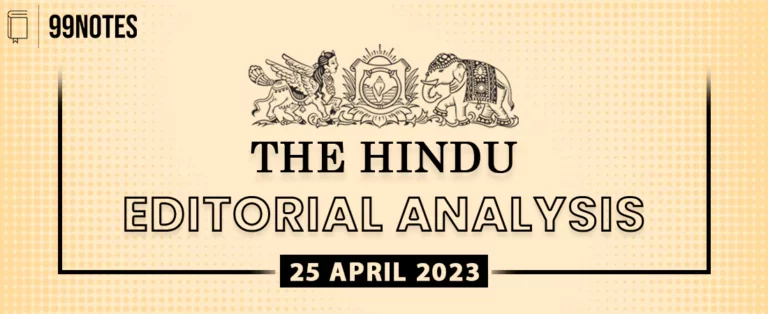21 February 2024 : The Hindu Editorial Notes PDF
The Hindu Editorial
21-February-2024
1. Having Panchayats as self-governing institutions.
| Topic: GS2 – Indian Polity – Constitution – Significant provisions. Critical for UPSC as it assesses knowledge on constitutional amendments, fiscal devolution, and challenges in local governance for India’s aspirants. |
| Context |
|
Background:
- 73rd and 74th Constitutional Amendments Acts in 1992 empowered local bodies for self-governance in India.
- Ministry of Panchayati Raj formed in 2004 to strengthen rural local governments.
Fiscal Devolution:
- Some states have excelled, while others lag in devolution commitment.
- Constitutional amendment emphasizes fiscal devolution, including own revenue generation.
Current Revenue Status:
- Panchayats earn only 1% through taxes; 80% from the Centre and 15% from States.
- Despite 30 years of devolution, revenue raised remains meager.
Own Source of Revenue (OSR):
- State Panchayati Raj Acts provide for taxation and non-tax revenue.
- Major own source of revenue (OSRs): Property tax, land revenue cess, stamp duty surcharge, tolls, profession tax, advertisement tax, user charges for services.
Expert Committee Report:
- Expert committee details OSR possibilities, including fees, rent, and income from investments.
- Recommends creating a conducive environment for effective taxation.
Role of Gram Sabhas:
- Gram sabhas crucial for local self-sufficiency and sustainable development.
- They have been empowered for planning, decision-making, and implementing revenue initiatives.
- Authority to impose taxes, fees, and levies for local development projects.
Discrepancies in Tax Collection:
- Inequitable tax collection responsibilities among gram, intermediate, and district panchayats.
- Gram panchayats collect 89%, intermediate 7%, and district panchayats only 5%.
Factors Hindering Revenue Generation:
- Central Finance Commission grants contribute to reduced interest in OSR.
- Dependency on grants increases, and tax collections decrease over time.
- Lack of incentivisation and penalties for defaulters.
Overcoming Dependency:
- Challenges include a societal ‘freebie culture’ and reluctance to impose taxes.
- Need for educating elected representatives and the public on the importance of revenue generation.
- Gradual reduction of dependency on grants for sustained self-sufficiency.
Future Recommendations:
- Dedicated efforts needed at all governance levels, including state and central, to minimize dependency syndrome.
- Panchayats should strive towards self-sufficiency through consistent revenue-generation initiatives.
Conclusion:
- Despite constitutional provisions, challenges persist in achieving meaningful fiscal devolution and self-sufficiency at the grassroots level.
- Education, incentivization, and consistent efforts are crucial for promoting local self-governance in India.
| PYQ: Assess the importance of Panchayat system in India as a part of local government. Apart from government grants, what sources the Panchayats can look out for financing developmental projects. (250 words/15m) (UPSC CSE (M) GS-2 2018) |
| Practice Question: Discuss the challenges and prospects of fiscal devolution in Indian local governance, emphasizing the role of panchayats and strategies to enhance self-sufficiency. (250 words/15 m) |
2. The real threat to the India as we know it
| Topic: GS2 – Indian polity – Parliament Crucial for UPSC as it assesses understanding of contemporary Indian political dynamics, parliamentary challenges, and constitutional principles. |
| Context |
|
Introduction:
- The conclusion of the 17th Lok Sabha sets the stage for the upcoming general election.
- The final parliamentary session reflects increased divisiveness, raising concerns about the future of Indian parliamentary democracy.
Constitutional Safeguards:
- India, with a robust Constitution, Fundamental Rights, Duties, and Directive Principles, has sustained democracy.
- Current decline in parliamentary practices sparks worries about Parliament’s ability to maintain stable democracy.
Global and Internal Dynamics:
- External factors like global tensions (Ukraine, West Asia) and concerns about China exist but don’t pose immediate threats.
- Internal issues, like security concerns and regional conflicts, are manageable but require attention.
Political Division:
- Nation appears more divided than before, with accusations and vitriol between the ruling party and the opposition.
- The government cites the Opposition creating a “North-South Divide” and promoting divisive language.
Impact of Polarized Politics:
- On the verge of a critical election, polarized politics exacerbates divisive tendencies.
- Issues like the Ram Temple consecration become election points, contributing to a perceived Hindu majoritarianism.
Federalism Concerns:
- Federalism, a constitutional cornerstone, appears compromised with attempts like Uniform Civil Code and “One Nation, One Election.”
- Opposition accuses the ruling party of breaching federal principles, undermining regional parties.
Engineered Defections:
- Engineered defections, especially in an election year, challenge democracy and electoral integrity.
- Instances of high-level defections to the ruling party raise concerns about altering electoral verdicts by other means.
Governor’s Role and Centre-State Relations:
- Governors’ roles in Opposition-ruled states become contentious, leading to strained Centre-State relations.
- Perceived violations of constitutionally mandated conduct contribute to a breakdown in relations between the Centre and States.
Absence of Rules-Based Order:
- Lack of a rules-based order in Centre-State relations and party-to-party interactions poses dangers to the democratic system.
- Without adherence to constitutional principles, democracy under a constitutional mandate may cease to exist.
Need for Dispassionate Analysis:
- Onus lies mainly on the Centre, but both the ruling party and the Opposition need to uphold constitutional niceties.
- Tolerating differences, subordinating everything to the Constitution, and managing rivalries within constitutional boundaries are crucial.
Conclusion:
- A collapse of Constitution-mandated rules of business threatens democracy, emphasizing the need for dispassionate analysis and adherence to constitutional principles.
| Practice Question: Discuss the challenges to Indian parliamentary democracy, emphasizing factors like political polarization, federalism concerns, and engineered defections. (150 words/10 m) |
For Enquiry

21 February 2024 : The Hindu Editorial Notes PDF

SCIENCE REPORTER SUMMARY: DECEMBER 2023

20 Feb 2024 : Daily Current Affairs Quiz

20 Feb 2024 : Daily Answer Writing

20 Feb 2024 : Daily Current Affairs

20 February 2024 : The Hindu Editorial Notes PDF

20 February 2024 : PIB Summary for UPSC

20 Feb 2024 : Indian Express Editorial Analysis

19 Feb 2024 : Daily Current Affairs Quiz

19 Feb 2024 : Daily Answer Writing
Feb 2024 The Hindu 21 February 2024 : The Hindu Editorial Notes PDF The Hindu Editorial
20-February-2024
1. January’s export numbers suggest global shipping woes are yet…
Science Reporter SCIENCE REPORTER SUMMARY: DECEMBER 2023 ARTICLE 1: PETRIFIED WOODS
Formation of Petrified Wood
Petrified wood is formed through a process called…
Daily Quiz 20 Feb 2024 : Daily Current Affairs Quiz 20 Feb 2024 : Daily Quiz…
mains answer writing 20 Feb 2024 : Daily Answer Writing Mains Answer Writing
20-February-2024
Q1) “Fraternity means a sense of brotherhood of all Indians…
Daily Current Affairs 20 Feb 2024 : Daily Current Affairs Daily Current Affairs
20-February-2024- Top News of the Day
1. Centre’s Crop Diversification Proposal…
Feb 2024 The Hindu 20 February 2024 : The Hindu Editorial Notes PDF The Hindu Editorial
20-February-2024
1. January’s export numbers suggest global shipping woes are yet…
feb 2024 PIB 20 February 2024 : PIB Summary for UPSC PIB Summary for UPSC
20-February -2024
1. A two-day INDUS-X Summit to be held in New Delhi
Topic:…
Indian Express 20 Feb 2024 : Indian Express Editorial Analysis Indian Express Editorial Analysis
20-February-2024
1. A wider viewfinder
Topic: GS2 – International…
Daily Quiz 19 Feb 2024 : Daily Current Affairs Quiz 19 Feb 2024 : Daily Quiz…
mains answer writing 19 Feb 2024 : Daily Answer Writing Mains Answer Writing
19-February-2024
Q1) “Judicial activism is an effective way to promote democratic…



